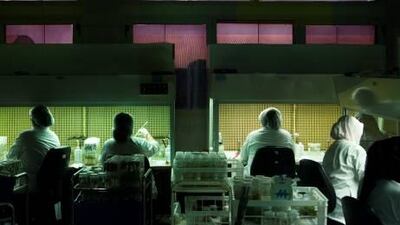ABU DHABI // Five top universities have joined forces to push for more support and cash for research and development.
The provosts of United Arab Emirates University and Zayed University, the presidents of Khalifa University and Masdar Institute and the chancellor of the American University of Sharjah are on the founding board of the new University Leadership Council.
The project has taken more than a year to set up. The academics hope it will help the institutions to lobby for greater support from government and industry for R&D.
Research spending is less than 0.1 per cent of gross domestic product, compared with more than 3 per cent in Finland and Japan and more than 2.5 per cent in Denmark and the United States.
The council has no powers and is not established by government mandate, but its members hope for strength in numbers.
"We will be like an advocacy group for research funding," said Prof Rory Hume, provost of UAEU.
"As a group it will be much easier for us to have our voices heard by government and industry.
"Collectively I hope they will listen to us and see this is not just about forwarding our own agenda, but the interests of the country as a whole."
What the founding five universities share is their focus on research. Now they are looking to attract other institutions with a similar slant.
The council's first challenge will be at its symposium in the capital next month, when members will lobby government and industry for research funding on the basis of its benefits to society.
Prof Tod Laursen, the president of Khalifa University, described the forum as "a chance to … focus the discussion around some of those key technology areas of emphasis such as health care and energy.
"We can learn from each other what capacities are already there, such as in the private sector, and what we can do collectively."
Dr Larry Wilson, provost of Zayed University, said it would help to build a research culture, teaching industry and government what research means and the benefits it can bring to them.
He expects academics to have mixed opinions. "Some will be really excited about this while others will say we're already doing this anyway."
He hopes it will help the universities to work together better on collaborative efforts, promoting academics between institutions and sharing their work to encourage a "symbiosis".
"In other developing countries, you don't have so many colleges close by, so you have to look to institutions literally in other countries, not a one or two-hour drive away. This is why it's even more important to build these relationships and know what each other is doing."
As well as knowledge, the universities could end up sharing their expensive pieces of research hardware. "Some of the equipment I had in the States was $500,000 just for one piece and that makes equipping institutions very costly.
"Knowing what other institutions have through this group will make it easier for people to go to other places to use a particular piece of equipment. This access would be an enormous asset."
But there will be no less competition, he said. "It's healthy. We can each do better because we're spurring each other forward."
Dr Peter Heath, chancellor of AUS, said: "We will compete as universities quite aggressively for the best students and for what research funds are out there, but we are strongly joined together in the mindset that only by working together will we help the country to reach its very important goals."

